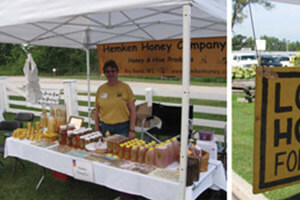
I’ve met a number of new beekeepers, excited to begin keeping bees. They have been through a class, and navigated various beekeeping situations throughout the summer. Then in August they harvest their honey, finding an extra five gallon pail or two, full of nature’s bounty. After family, coworkers and neighbors have their supply of your honey, what to do with the excess? We have been selling our honey and candles at farm markets for about 17 years. I hope to pass along some tips and handy hints, for being successful, that we have learned by trial and error.
Farm markets have become very popular in many areas. People are becoming more aware that they can buy local, and procure a better and more wholesome product than at their local big box store or mega-grocery. We as beekeepers can take advantage of this trend and pay for our beekeeping at the same time. Farm markets are generally easy to do, but you need to be organized. Along with weekly markets we participate in flea markets, church markets and other one-time markets and events. Our daughter even manages one of the markets now.
There are differences in markets around the country, in cities and smaller communities. Here in southeast Wisconsin there are large and small markets and some competing markets within communities. Each community wants to hop on the bandwagon to start up a market of their own, when surrounding towns may already have markets. There are only so many good vendors and markets to go around. You should do your homework to find out where the markets are and how they operate. Visit various market locations to see which will be a good fit for your business and products.
Generally, successful markets are well managed. Occasionally, there are management concerns or issues between vendors. Most of these can be worked out through the market manager. The market manager organizes the market, makes the rules, does the enforcement and works to help each vendor be successful. Get to know your manager, and be nice to them. Make sure they know who you are, and how you can be an asset to the market.
Occasionally, there will be another honey vendor at a market. In our area, there is an unwritten rule of respect among beekeepers trying not to push into markets, particularly smaller ones, if there is already a beekeeper selling there. We were invited to a market where there was another beekeeper. We made a point to introduce ourselves; they are wonderful people. We do some cooperation, get along very well, and just try not to compete with each other. Most times a small market just can’t support two honey vendors; no one makes money. An important rule is to never criticize another vendor at the market.
Through cooperation, vendors can help each other and help promote the market. Making purchases from other vendors and if you are comfortable with it, bartering or offering small discounts goes a long way in supporting each other. This can sometimes lead to other business contacts or opportunities.
The venue of markets vary significantly. Booth space and weather are important factors to consider when deciding what you will need to take in addition to your product. Some markets are located indoors; inside schools, churches or community centers. These are sheltered from the elements and are a lot easier to pack for. Inside markets sometimes provide tables and chairs.
Outside markets are more common. A pop-up tent is for your protection; it gets hot, sprinkles, rains, snows; you get the picture. The quality of tents will vary widely, and you generally get what you pay for. You may be using these tents once a week, or many times a week, and they will need to stand up to some rough use. Invest in good tents, don’t forget the tent sides and learn how to properly attach them. Bring weights or tie downs for the tent; the wind will pick up or there will be gusts. The most common are weights that hang on the four corner poles. Weights can be made from 2” PVC pipe, filled with scrap metal and sand. The large snap clips make it easy to clip them onto the overhead tent supports. We make them four feet long so that they store cross-ways in our minivans. I have previously written about making tent weights. Your spot at the market might be on grass, gravel, asphalt or concrete. Make a plan, in advance, for securing your tent and product on these surfaces. There will be times when weather changes, or problems arise and you will have to pack up quickly; again be prepared for this. It will happen at some point.
One of the things to consider is to register for the same booth location every year. A lot of buyers are happier if they can find you right away at a market, instead of having to
…


